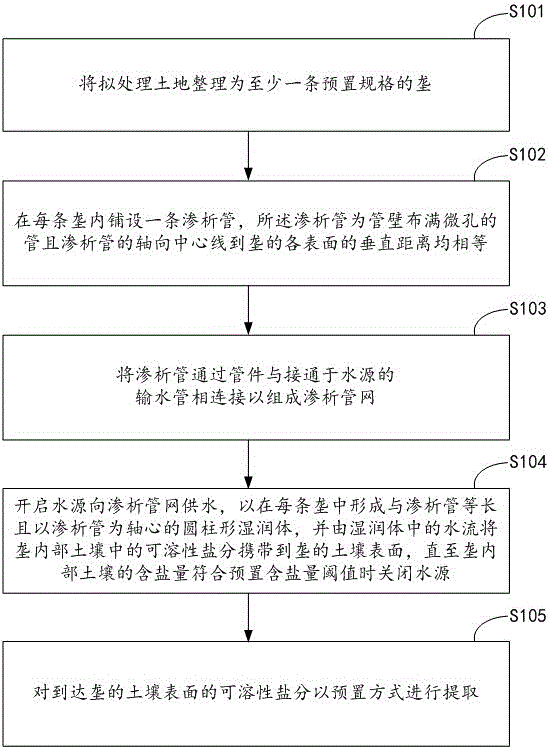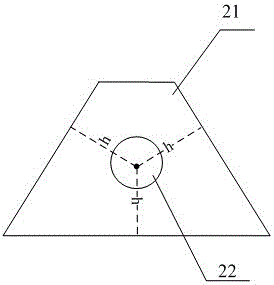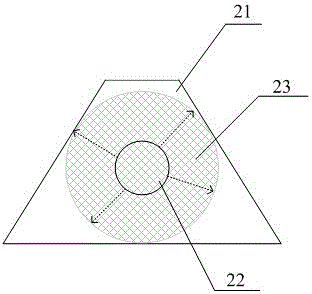Method for extracting soluble salt in soil
A soluble, salinity technology, applied in land preparation methods, applications, agricultural machinery and implements, etc., to achieve the effect of low water consumption and small amount of civil engineering
- Summary
- Abstract
- Description
- Claims
- Application Information
AI Technical Summary
Problems solved by technology
Method used
Image
Examples
example 1
[0069] Example 1: Extracting Sodium Chloride from Soil
[0070] The salt content of the soil sample is 0.4%, which is clay loam, and the field water holding capacity is 29%. The change of the salt content in the soil is detected with a conductivity meter, and the soil moisture content is monitored with a soil moisture meter. The water source is tap water, which is adjusted with a pressure reducing valve. The pressure controls the water supply per unit time of the dialysis tube, and the micro-moisture tube is selected as the dialysis tube.
[0071] The soil is organized into a trapezoidal ridge with a height of 40cm, a width of 60cm for the lower step, and a width of 20cm for the upper step. A water source with a pressure regulator was connected, and a 0.5 cm thick geotextile was laid on the soil surface of the ridge as an adsorption layer.
[0072] After the water is passed through the dialysis tube, keep the water pressure at 0.02Mpa, and the water seeps out from the wall of...
example 2
[0077] In the dialysis process in Example 1, the salt in the soil directly below the dialysis tube is carried downward by the micro-water flow, and is enriched at the deep soil moisture peak. This part of the salt remains in the soil, and the deep soil The salt content of the is much higher than that of the cylindrical wet body.
[0078] After the first dialysis is completed, the water supply is stopped, and the residual salt is governed by the entropy increase principle of the second law of thermodynamics, and automatically diffuses from the high content to the low content in the cylindrical wet body, and finally disappears at the high content, and the residual salt is evenly distributed. The state of being distributed in the soil of a cylindrical wetted body. At this time, the water source is turned on again, that is, the dialysis process is performed again, and the residual salt is dialysised again.
[0079] Under normal circumstances, after the second dialysis, the salini...
example 3
[0081] The dialysis process is exactly the same without laying the adsorption layer, but since there is no adsorption layer, the salt is enriched on the soil surface during the dialysis process, and the soil surface must be directly treated.
[0082] The method is to scrape off the soil with a thickness of about 1cm on the soil surface (this layer of soil has a high salt content) and insert it into the extraction equipment, soak it with an appropriate amount of water to transfer the soluble salt in the soil to the water, and after taking it out after soaking After cleaning the soil, evaporate the water containing soluble salts in the extraction equipment to crystallize the soluble salts. The disadvantage of this method is that it is troublesome to operate, and it is labor-intensive and time-consuming.
PUM
 Login to View More
Login to View More Abstract
Description
Claims
Application Information
 Login to View More
Login to View More - R&D
- Intellectual Property
- Life Sciences
- Materials
- Tech Scout
- Unparalleled Data Quality
- Higher Quality Content
- 60% Fewer Hallucinations
Browse by: Latest US Patents, China's latest patents, Technical Efficacy Thesaurus, Application Domain, Technology Topic, Popular Technical Reports.
© 2025 PatSnap. All rights reserved.Legal|Privacy policy|Modern Slavery Act Transparency Statement|Sitemap|About US| Contact US: help@patsnap.com



